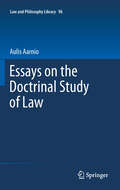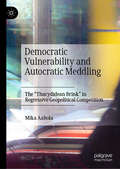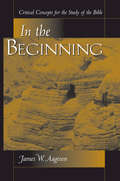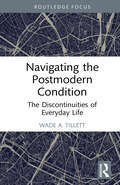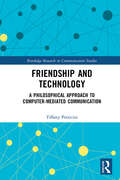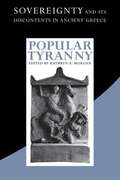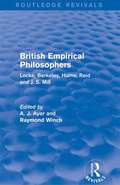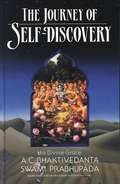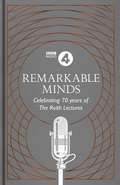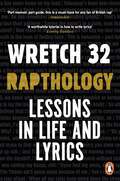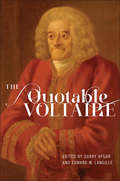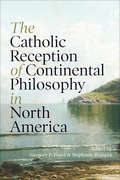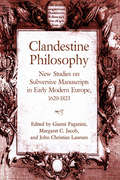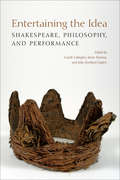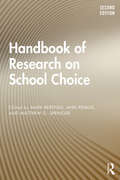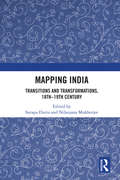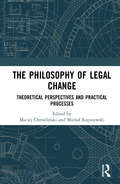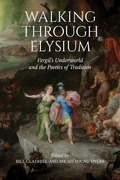- Table View
- List View
Essays on the Doctrinal Study of Law
by Aulis AarnioEssays on the Doctrinal Study of Law is a summary of the author's 40 years of research in the fields of civil law and the philosophy of law. The main focus is on the two main tasks in the doctrinal study of law: the interpretation and systematisation of legal norms. In this regard, Professor Aarnio deals with the theory of argumentation as well as with its foundations - i.e., with the ontology, epistemology and methodology of legal thinking - and develops the ideas that were first presented in The Rational as Reasonable (Kluwer 1987) in all of these dimensions. The work includes an updated discussion on the writings of Robert Alexy, Jûrgen Habermas, Ronald Dworkin and Alf Ross. A focal point of view concerns the distinction between positivism and non-positivism, in which the core of the criticism focuses on Scandinavian realism.
Democratic Vulnerability and Autocratic Meddling: The "Thucydidean Brink" in Regressive Geopolitical Competition
by Mika AaltolaThis book investigates complex regressive dynamics in contemporary Western democracies. They include not only severe polarization in domestic politics, but also efforts by external autocratic powers to co-opt the increasingly digitalized political processes in the West. The discussion on democratic vulnerability and regression has rarely been historically and theoretically reflective. The aim is to fill this relative void by drawing on classical sources to inform about the political anxieties and agitations of our present time as the Western world moves towards new critical elections. The key concept of the analysis, a Thucydidean brink, refers to a critical point where the attraction felt towards an outside geopolitical competitor becomes stronger than the political affinity felt towards one’s domestic political opponent. As political polarization, societal decomposition and the collusive tendencies grow in strength, political factions and political candidates in western societies can be(come) drawn to autocratic actors. Perhaps most alarmingly, the resulting nexus between democracies and autocracies can further intensify mutual regression and form downwards-sloping spirals that are not ultimately under any strategic control. This book draws from the experiences of recent elections in major Western democracies to illustrate the widening and deepening underlying regressive tendency.
In The Beginning: Critical Concepts For The Study Of The Bible
by James AagesonA short introduction to the Bible, this text provides readers with insights into reading and studying the Bible.
Culture and Art: an Anthology
by Lars Aagaard-MogensenAn anthology of works about the connection between art and culture.
Navigating the Postmodern Condition: The Discontinuities of Everyday Life
by Wade A. TillettDrawing on poststructuralist frameworks, this book examines the way to a radical acceptance of daily discontinuities and difference as it allows us to embrace life in the postmodern world.With each chapter exploring the human relationship with a disjunction in daily life, such as sleeping, forgetting, and multitasking, the author examines overlooked aspects of daily living as fresh data from which to analyze our condition. A phenomenological study of postmodern life, the book provides anecdotes of what it is like to live through these gaps and theorizes how we use these gaps. Using an arts-based methodology, the author also allows the work to mirror the discontinuities which it describes, interrupting the assumption of our lives as continuous and unitary in both form and content. Addressing the vast jumble of contradictions that is our daily experience in this contemporary world, it offers explanation through theory and anecdote and illustrates the path toward radical acceptance, which allows us to see ourselves as beautifully composed of fractures, gaps, and overflow. It will appeal to scholars, researchers, and postgraduate students with interests in poststructuralism, curriculum theory, and art-based research methods.
Friendship and Technology: A Philosophical Approach to Computer Mediated Communication (Routledge Research in Communication Studies)
by Tiffany A. PetriciniThis book explores the nature of technology – participatory media in particular – and its effects on our friendships and our fundamental sense of togetherness. Situating the notion of friendship in the modern era, the author examines the possibilities and challenges of technology on our friendships. Taking a media ecology approach to interpersonal communication, she looks at issues around phenomenology, recognition of friends as unique, hermeneutics in a digital world and mediated communication, social dimensions of time and space, and communication ethics. Examining friendship as a communicative phenomenon and exploring the ways in which it is created, sustained, managed, produced, and reproduced, this book will be relevant to scholars and students of interpersonal communication, mediated communication, communication theory and philosophy, and media ecology. This book is freely available as a downloadable Open Access PDF under a Creative Commons Attribution-Non Commercial-No Derivatives 4.0 license.https://www.taylorfrancis.com/books/mono/10.4324/9781003188810/friendship-technology-tiffany-petricini
Popular Tyranny: Sovereignty and Its Discontents in Ancient Greece
by Morgan Kathryn A.The nature of authority and rulership was a central concern in ancient Greece, where the figure of the king or tyrant and the sovereignty associated with him remained a powerful focus of political and philosophical debate even as Classical Athens developed the world's first democracy. This collection of essays examines the extraordinary role that the concept of tyranny played in the cultural and political imagination of Archaic and Classical Greece through the interdisciplinary perspectives provided by internationally known archaeologists, literary critics, and historians.<P><P>The book ranges historically from the Bronze and early Iron Age to the political theorists and commentators of the middle of the fourth century B.C. and generically across tragedy, comedy, historiography, and philosophy. While offering individual and sometimes differing perspectives, the essays tackle several common themes: the construction of authority and of constitutional models, the importance of religion and ritual, the crucial role of wealth, and the autonomy of the individual. Moreover, the essays with an Athenian focus shed new light on the vexed question of whether it was possible for Athenians to think of themselves as tyrannical in any way. As a whole, the collection presents a nuanced survey of how competing ideologies and desires, operating through the complex associations of the image of tyranny, struggled for predominance in ancient cities and their citizens.
British Empirical Philosophers: Locke, Berkeley, Hume, Reid and J. S. Mill. [An anthology] (Routledge Revivals)
by A. J. Ayer and Raymond WinchFirst published in 1952, British Empirical Philosophers is a comprehensive picture of one of the most important movements in the history of philosophic thought. In his introduction, Professor A. J. Ayer distinguishes the main problems of empiricism and gives a critical account of the ways in which the philosophers whose writings are included in this volume attempted to solve them. Editors Ayer and Raymond Winch bring together an authoritative abridgement of John Locke’s Essay Concerning Human Understanding; Bishop George Berkeley’s Principles of Human Knowledge; almost the entire first book of David Hume’s Treatise Concerning Human Nature; and extracts from Thomas Reid’s Essay on the Intellectual Powers of Man and John Stuart Mill’s Examination of Sir William Hamilton’s Philosophy.
The Journey of Self Discovery
by A. C. Bhaktivedanta PrabhupadaAmid the parched desert of materialism, "The Journey of Self-Discovery" offers a sure pathway to the oasis of higher, spiritual awareness.
Remarkable Minds: A Celebration of the Reith Lectures
by BBC Radio 4IDEAS THAT HAVE THE POWER TO CHANGE THE WORLDThe best of an extraordinary 70 year archive, gathered in one volume for the first time. The prestigious BBC Reith Lectures have been enriching the world with new ideas since 1948. Every year, a world-leading thinker is invited to speak on a topic of their choosing, spanning art, science, nature, technology, history, religion, society, culture, politics and much more. Unearthing forgotten gems as well as sharing the latest in intellectual thought, Remarkable Minds is a time capsule into our changing world that provides wise words for turbulent times. With a foreword by Anita Anand, presenter of the Reith Lectures, and an introduction by Gwyneth Williams, controller of Radio 4, 2010-2019.
Remarkable Minds: A Celebration of the Reith Lectures
by BBC Radio 4IDEAS THAT HAVE THE POWER TO CHANGE THE WORLDThe best of an extraordinary 70 year archive, gathered in one volume for the first time. The prestigious BBC Reith Lectures have been enriching the world with new ideas since 1948. Every year, a world-leading thinker is invited to speak on a topic of their choosing, spanning art, science, nature, technology, history, religion, society, culture, politics and much more. Unearthing forgotten gems as well as sharing the latest in intellectual thought, Remarkable Minds is a time capsule into our changing world that provides wise words for turbulent times. With a foreword by Anita Anand, presenter of the Reith Lectures, and an introduction by Gwyneth Williams, controller of Radio 4, 2010-2019.
Rapthology: Lessons in Life and Lyrics
by Jermaine Scott 32'Groundbreaking... Part memoir, part guide, this is a must-have.' Independent'A worthwhile tutorial.' Evening Standard"Poetry and rap come from the same family. They're brothers. Just because you're good at one doesn't necessarily mean you'll be good at the other, but if you master both you'll be unparalleled."Rapthology is a masterclass in lyric writing. A spotlight into the craft and skill of what it takes to be an incredible artist by pioneering musician and artist, Wretch 32. Taking us through the songs which have shaped his career over the last two decades step by step, explaining what each song means to him, his own creative process, from the first flashes of inspiration to final edits and improvisation, right through to how popular and powerful his lyrics are.Part autobiography, part guide to creativity and part cultural history Rapthology is a blueprint to the music that matters.
The Quotable Voltaire
by François-Marie Arouet (1694-1778)The author of more than 2,000 books and pamphlets, Voltaire (François-Marie Arouet, 1694-1778) was one of the most prolific writers of the eighteenth century, and also one of the wittiest and most insightful. This unique collection of over 800 of Voltaire’s wisest passages and choicest bons mots runs the gamut on topics from adultery to Zoroaster, in both English and French. Drawing from a wide range of his publications, private letters, and remarks recorded by his contemporaries, The Quotable Voltaire includes material never before gathered in a single volume. English translations appear alongside the original French, and each quote is thoroughly indexed and referenced, with page numbers for both the first known publication edition of each entry and the most recent edition of Voltaire’s works. The book also features over 400 quotes about Voltaire, including commentary by eighteenth-century luminaries like Samuel Johnson, Catherine the Great, Casanova, and John Adams, as well as an eclectic assortment of modern-day personages ranging from Winston Churchill and Jorge Luis Borges to Mae West and Mike Tyson. Lavishly illustrated with nearly three dozen images of Voltaire-related art, this collection opens with a scholarly essay that recounts the great man’s life and reflects on his outsized influence on Western culture. Whether you are a Voltaire scholar or a neophyte, The Quotable Voltaire is the perfect introduction to a brilliant mind.
The Catholic Reception of Continental Philosophy in North America
This volume by leading philosophers and theologians explores the reception of continental philosophy in North America and its ongoing relation to Catholic institutions. What has prompted so many North American Catholics to support this particular school of thought? Why do so many Catholics continue to find continental philosophy attractive, and why do so many continental philosophers work in Catholic departments? The establishment of the relationship between continental philosophy and Catholicism was not obvious, nor was it easy. Many of the contributors to this volume have played important roles in its development, and in these pages they take a stance on this evolving relationship and demonstrate that the engagement is far from over. Exploring the mutual interests that made this alliance possible as well as the underlying tensions, the volume provides, for the first time, an extended reflection on the historical, institutional, and intellectual relationship between Catholicism and continental philosophy on North American soil up to the present day.
Clandestine Philosophy: New Studies on Subversive Manuscripts in Early Modern Europe, 1620–1823 (UCLA Clark Memorial Library Series)
Clandestine philosophical manuscripts, made up of forbidden works including erotic texts, political pamphlets, satires of court life, forbidden religious texts, and books about the occult, had an avid readership in the seventeenth and eighteenth centuries, becoming objects of historical research by the twentieth century. The purveyors of the clandestine could be found in the Dutch Republic, Switzerland, Denmark, Spain, and not least in Paris or London. Despite the heavy risks, including prison, the circulation of these manuscripts was a prosperous venture. After Ira Wade’s pioneering contribution (1938), Clandestine Philosophy is the first work in English entirely focused on the philosophical clandestine manuscripts that preceded and accompanied the birth of the Enlightenment. Topics from philosophy, political and religious thought, and moral and sexual behaviour are addressed by contemporary authors working in both America and Europe. These manuscripts shed light on the birth of pornography and provide an important avenue for investigating philosophical, religious, political, and social critique.
Entertaining the Idea: Shakespeare, Performance, and Philosophy (UCLA Clark Memorial Library Series)
To entertain an idea is to take it in, pay attention to it, give it breathing room, dwell with it for a time. The practice of entertaining ideas suggests rumination and meditation, inviting us to think of philosophy as a form of hospitality and a kind of mental theatre. In this collection, organized around key words shared by philosophy and performance, the editors suggest that Shakespeare’s plays supply readers, listeners, viewers, and performers with equipment for living. In plays ranging from A Midsummer Night’s Dream to King Lear and The Winter’s Tale, Shakespeare invites readers and audiences to be more responsive to the texture and meaning of daily encounters, whether in the intimacies of love, the demands of social and political life, or moments of ethical decision. Entertaining the Idea features established and emerging scholars, addressing key words such as role play, acknowledgment, judgment, and entertainment as well as curse and care. The volume also includes longer essays on Shakespeare, Kant, Husserl, and Hegel as well as an afterword by theatre critic Charles McNulty on the philosophy and performance history of King Lear.
Handbook of Research on School Choice
Updated to reflect the latest developments and increasing scope of school-based options, the second edition of the Handbook of Research on School Choice makes readily available the most rigorous and policy-relevant research on K–12 school choice. This comprehensive research handbook begins with scholarly overviews that explore historical, political, economic, legal, methodological, and international perspectives on school choice. In the following sections, experts examine the research and current state of common forms of school choice: charter schools, school vouchers, and magnet schools. The concluding section brings together perspectives on other key topics such as accountability, tax credit scholarships, parent decision-making, and marginalized students. With empirical perspectives on all aspects of this evolving sphere of education, this is a critical resource for researchers, faculty, and students interested in education policy, the politics of education, and educational leadership.
Mapping India: Transitions and Transformations, 18th–19th Century
This book presents an alternate history of colonial India in the 18th and the 19th centuries. It traces the transitions and transformations during this period through art, literature, music, theatre, satire, textiles, regime changes, personal histories and migration. The essays in the volume examine historical events and movements which questioned the traditional parameters of identity and forged a new direction for the people and the nation. Viewing the age through diverse disciplinary angles, the book also reflects on the various reimaginings of India at the time. This volume will be of interest to academics and researchers of modern Indian history, cultural studies and literature. It will also appeal to scholars interested in the anthropological, sociological and psychological contexts of imperialism.
The Philosophy of Legal Change: Theoretical Perspectives and Practical Processes
Democratic legal systems have recently been subject to rapid and multi-directional processes of change. There are numerous sociological, technological, ideological, or purely political processes which result in law’s amendment and transformation. This book argues that this legal change is best understood from a political philosophy perspective. This can be used as an interpretative device to understand the ongoing processes of change as well as their outcomes such as new laws, judicial interpretations, or constitutional amendments. The work has three main objectives: to provide deeper understanding of the problems of legal change within the diversity of Western political and legal thought; to examine the development of the processes of change in terms of their normative and prudential acceptability; to interpret actual processes of change with a view to the general theoretical and normative background. The book is divided into three parts: Part I sets the scene and is focused on the general issues important for understanding and evaluating legal change from the perspective of political philosophy; Part II focuses on the spectrum of politico-philosophical justifications present in the political culture of democratic states; Part III offers selected case studies to specify and apply the philosophical ideas in the previous parts. The book will be a valuable resource for students and scholars of law and jurisprudence, including comparative legal studies and human rights law, political theory, and philosophy.
Walking through Elysium: Vergil’s Underworld and the Poetics of Tradition (Phoenix Supplementary Volumes)
Walking through Elysium stresses the subtle and intricate ways writers across time and space wove Vergil’s underworld in Aeneid 6 into their works. These allusions operate on many levels, from the literary and political to the religious and spiritual. Aeneid 6 reshaped prior philosophical, religious, and poetic traditions of underworld descents, while offering a universalizing account of the spiritual that could accommodate prior as well as emerging religious and philosophical systems. Vergil’s underworld became an archetype, a model flexible enough to be employed across genres, and periods, and among differing cultural and religious contexts. The essays in this volume speak to Vergil’s incorporation of and influence on literary representations of underworlds, souls, afterlives, prophecies, journeys, and spaces, from sacred and profane to wild and civilized, tracing the impact of Vergil’s underworld on authors such as Ovid, Seneca, Statius, Augustine, and Shelley, from Pagan and Christian traditions through Romantic and Spiritualist readings. Walking through Elysium asserts the deep and lasting influence of Vergil’s underworld from the moment of its publication to the present day.
